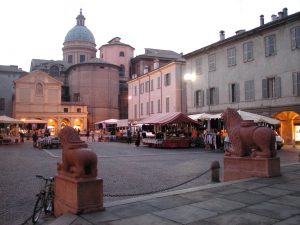 The Reggio Emilia Approach is an educational philosophy based on the image of the child, and of human beings, as possessing strong potentials for development and as a subject of rights who learns and grows in the relationships with others.
The Reggio Emilia Approach is an educational philosophy based on the image of the child, and of human beings, as possessing strong potentials for development and as a subject of rights who learns and grows in the relationships with others.
This global educational project, which is carried forth in the Municipal Infant-toddler Centres and Preschools of Reggio Emilia, Italy, and has inspired other schools all over the world, is based on a number of distinctive characteristics: the participation of families, the collegial work of all the personnel, the importance of the educational environment, the presence of the atelier and the figure of the atelierista, the in-school kitchen, and the pedagogical coordinating team.
Focusing on the centrality of the hundred languages belonging to every human being, in the atelier spaces young children are offered daily opportunities to encounter many types of materials, many expressive languages, many points of view, working actively with hands, minds, and emotions, in a context that values the expressiveness and creativity of each child in the group.
It is impossible to replicate the Reggio Emilia Approach but it is possible to develop a local South Australian approach as education must be constructed within its local context.
Re-imagining childhood in South Australia first and foremost requires a fundamental change in thinking about the child:
- Moving from the view of the child as being ‘weak’ or ‘cute’, to recognition of the competent and capable child who possesses many resources from birth.
- Moving from an emphasis on children with needs, to a focus on the rights of all children.
- Moving from the acceptance that children are invisible, to recognition that children are fully participating citizens from birth.
These reconstructions will need to occur in attitudes, in ways of thinking, and in approaches to early childhood [page 42].
The Re-imagining Childhood: The inspiration of Reggio Emilia education principles in South Australia can be downloaded by clicking the below link.
